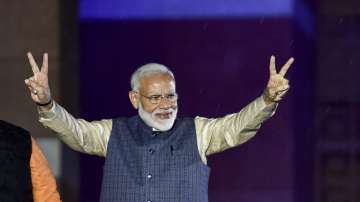Zero tolerance towards terrorism and checking illegal immigration will be the focus areas of the second Modi government, which may also take some tough actions like implementing the NRC across the country and annulling Article 35A in Jammu and Kashmir.
The BJP-led NDA has received a landslide mandate in the just-concluded Lok Sabha elections with the saffron party winning 303 of the 542 seats that went to polls this time.Narendra Modi is set to assume the charge as prime minister for a second time on Thursday.
The "decisive leadership" of Modi has "fundamentally altered" the national security paradigm of India in the last five years and his government will look at a zero tolerance approach towards terrorism in the next five years, according to the BJP manifesto 'Sankalp Patra', released before the general elections.
"Our security doctrine will be guided by our national security interest only. This is exemplified by the surgical strikes and the air strikes carried out recently.
"We will firmly continue our policy of 'Zero Tolerance' against terrorism and extremism and will continue to follow our policy of giving a free hand to our security forces in combating terrorism," it said.
The party is "committed to annulling Article 35A" of the Constitution of India as the provision is "discriminatory against non-permanent residents and women of Jammu and Kashmir", according to the BJP manifesto.
The article provides special rights and privileges to the natives of Jammu and Kashmir.
"We believe that Article 35A is an obstacle in the development of the state. We will take all steps to ensure a safe and peaceful environment for all residents of the state," it said.
"We will make all efforts to ensure the safe return of Kashmiri Pandits and we will provide financial assistance for the resettlement of refugees from West Pakistan, Pakistan occupied Jammu and Kashmir (POJK) and Chhamb," the BJP manifesto said.
Article 35A was incorporated in the Constitution in 1954 through a presidential order on recommendations of the then Prime Minister Jawahar Lal Nehru's cabinet.This provision gives permanent residents of the state special rights and privileges in government jobs, scholarships, aids and acquisition of property.
No non-state subject can buy land or settle permanently in Jammu and Kashmir due to the article.
The BJP also reiterated its position since the time of the Jan Sangh to the abrogation of Article 370, which allows a separate flag and constitution for the state.
Referring to illegal immigration from neighbouring countries, the BJP manifesto said there has been a huge change in the cultural and linguistic identity of some areas due to illegal immigration, resulting in an adverse impact on the local people's livelihood and employment.
"We will expeditiously complete the National Register of Citizens (NRC) process in these areas on priority. In the future, we will implement the NRC in a phased manner in other parts of the country," it said.
Currently the NRC is being updated in Assam. When the draft NRC was published on July 30, 2018, there was a huge controversy over the exclusion of 40.7 lakh people from it.
The draft NRC included the names of 2.9 crore people out of the total 3.29 crore applications. The final NRC is expected to be published on July 31, 2019.
The Supreme Court-monitored NRC exercise, aimed at identifying illegal immigrants in the state that borders Bangladesh, was carried out only in Assam, which faced an influx of people from Bangladesh since the early 20th century.
Latest India News
